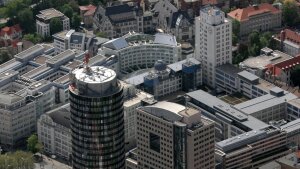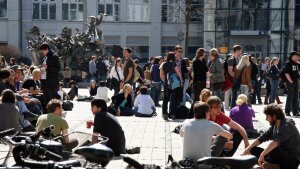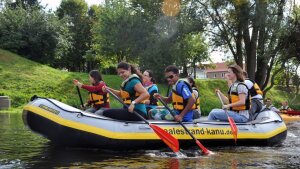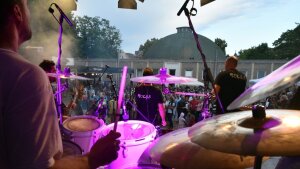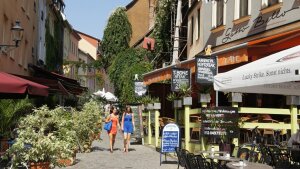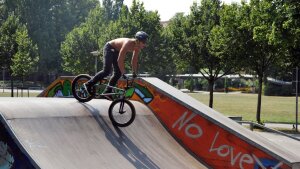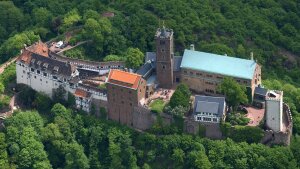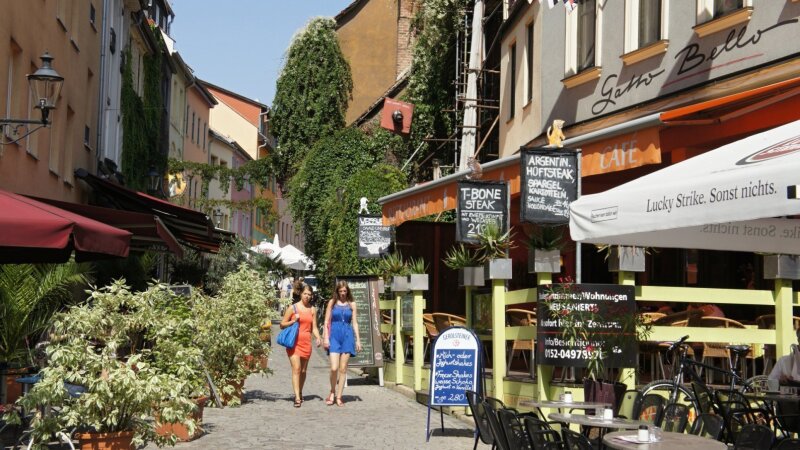Explore Jena by drone (2018)
placeholder image — Aerial view of the Beutenberg Science Campus in Jena.
Image: Ballonteam JenaA city that combines history and high tech
Jena city center.
Image: Jan-Peter Kasper (University of Jena)The city of JenaExternal link is brought to life by the fascinating combination of its interesting and impressive history, featuring many famous scientists, writers, philosophers and others, its delightful countryside, its innovative, international and research-oriented industry, as well as its vibrant student community. This rich variety creates a unique atmosphere which gives this small, lively city its special charm. Jena is well known as one of the most innovative and dynamic cities in Germany. Foreigners living here often emphasize that Jena is extraordinarily secure, clean, friendly, tolerant and affordable.
Students' paradise Jena
Jena university main campus.
Image: Anne Günther (University of Jena)There are few places where science penetrates as deeply into so many aspects of life as in Jena. More than 23,000 students and young career scientists shape the city's character. Apart from the more than 450-year-old Friedrich Schiller University de and the Ernst-Abbe-HochschuleExternal link, founded in 1991, there are approximately 30 other research institutions in which science plays a vibrant and prominent role. For these and other reasons, Jena was elected Germany's "Science CityExternal link" in 2008.
Jena's countryside
Rafting on the Saale
Image: Anne Günther (University of Jena)The traditional and, at the same time, innovative city of Jena is built on the banks of the Saale River. The Saale River Valley is enriched by various monuments associated with famous local historical figures, some of which achieved worldwide renown, giving credit to its cultural heritage. Besides its numerous tourist attractions, the city of Jena is nestled in a Mediterranean-like landscape with limestone hills up to 400 meters high and offers a variety of bicycle paths as well as hundreds of kilometers of well-kept hiking trails with breathtaking views.
Jena's academic and intellectual development
Monument of Goethe and Schiller in Weimar.
Image: Jan-Peter Kasper (University of Jena)Jena has been one of the most famous places for higher education in Germany since the founding of its university, the "Alma Mater Jenensis", in 1558. At the end of the 18th century, thanks to its close connection to the nearby royal seat at Weimar in addition to support from the world-famous German poets Johann Wolfgang von Goethe and Friedrich Schiller, the city in the Saale valley was directly influenced by the German Classical Period, developing into one of the most important intellectual centers in Germany. Today, with more than 6,000 employees, the Friedrich Schiller University Jena is the largest employer in the State of Thuringia.
Jena's economic development
Nonlinear optics laboratory.
Image: Jan-Peter Kasper (University of Jena)During the second half of the 19th century, Jena developed into an industrial city thanks to the work of three scientific and economic giants: Carl Zeiss, Otto Schott and Ernst Karl Abbe. Their collaboration led to the creation of the world-famous Carl Zeiss and Jena Schott glass factories. This effective cooperation between research institutes and economic enterprises has had a deep and lasting impact and has led to Jena's exceptional reputation as a high-technology location.
Today, no other German city is home to more research institutions in relation to the number of inhabitants than Jena (Städteranking 2023, IW Consult). With the university being ingrained in the entire city of Jena, it sets the pulse for a special atmosphere: the deep integration of science into urban society, and the citizens of Jena trust and identify with their university. The University of Jena, with its broad range of disciplines is the nucleus of the location and it is able to cover the entire innovation chain from excellent basic research (with University Hospital Jena, Max Planck and Leibniz institutes) to product development (with Fraunhofer and Helmholtz institutes, locally based high-tech industry). The university's strong interaction with non-university institutions and local industry including world-wide players creates a unique environment and mutual benefits, e.g., leading to numerous collaborations, start-ups and spin-offs.
Jena's modern cultural scene
Fulldome festival Jena.
Image: Anne Günther (University of Jena)Apart from museums for science, optics, literature, modern arts, and natural history, Jena also features an attractive cultural scene. The annual Kulturarena open-air music festivalExternal link, for instance, brings numerous international stars to Jena. Moreover, there are plenty of individual, top-class events offered by the Jena TheaterExternal link, the Agency for Cultural EventsExternal link ("Jenakultur"), the Jena Art SocietyExternal link and the Jena Philharmonic OrchestraExternal link year-round.
Sightseeing and shopping - Jena's city life
Wagnergasse in downtown Jena.
Image: Jan-Peter Kasper (University of Jena)The thing that students, business people and day-trippers love the most is the convivial mood in the cafés, restaurants and cozy, rustic pubs in the streets of our lovingly preserved historic city center. Here, the time-honored old town meets modern architecture, such as our shopping malls, the Goethe GalerieExternal link and the Neue MitteExternal link. The latter is located at the base of the 159 m-high JenTowerExternal link , which provides a fantastic panoramic view of the city and its surroundings from its impressive observation deck.
Jena for students
Skateboard park
Image: Christoph Worsch (University of Jena)Jena is not just where we want you to be, it's also where you will want to be! With more than 23,000 students in a city of 110,000 inhabitants, Jena is a young and vivacious city. Its many bars and cafés invite you to stay a while and chat with friends while various gigs, concerts, open-air events and theater performances let you dive into the cultural life of your host town. Or perhaps you would prefer to have a good time at one of our many clubs? It's up to you. By the way: Never mind if last night's visit to our night life activities was a late one. Jena's streets are as safe at night as they are during the day. In addition, trams and busses will bring you home at almost any time of day or night - free of charge for all students. We are sure you will find it just as enjoyable as we do.
...and much more beyond our city
The Wartburg castle, a UNESCO World Heritage Site close to Eisenach.
Image: Jan-Peter Kasper (University of Jena)Of course, there is much more to explore outside of Jena. Embedded in a green countryside of tiny villages with ancient churches, castles and sunny meadows, the surroundings of Jena invite you to rest, relax and explore the soul of Germany's green heart on the banks of the Saale river. Experience the tranquility of the place from which Johann Wolfgang von Goethe, Germany's national poet, drew his inspiration. By the way - if you would like to know where he lived, then visit Weimar, the city of the German literary classics and the European Cultural Capital of 1999. Use the train - free to all destinations in Thuringia - to reach Weimar in only 15 minutes. Once you're on the train, why not travel a little farther? Maybe to Erfurt with its medieval city center? To the Thuringian Forest for cross-country skiing? It's all within an hour's journey. And if you feel the need to travel to a large city like Berlin or Munich, you can reach these by train within two or three hours, respectively.
YouTube video from JenaWirtschaft: "Working and living in Jena"
Working & living in Jena
Image: Jan-Peter Kasper (University of Jena)